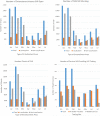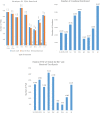The short-term effects of COVID-19 on HIV and AIDS control efforts among female sex workers in Indonesia
- PMID: 35081950
- PMCID: PMC8791089
- DOI: 10.1186/s12905-021-01583-z
The short-term effects of COVID-19 on HIV and AIDS control efforts among female sex workers in Indonesia
Abstract
Background: The COVID-19 pandemic has raised concerns as to its impact on other health programs. One program that appears particularly vulnerable is HIV and AIDS. We undertook an assessment of COVID-19 impact on HIV control efforts in Indonesia for a sub-population that has received little attention in the global literature-female sex workers (FSW).
Methods: The study was undertaken in 23 National AIDS program priority districts. Four sources of monthly data during January-July 2020 were considered. COVID-19 infection data were extracted from national and district surveillance systems. Combination prevention program outputs were reported by civil society organizations (CSOs) providing community support services to FSW. These organizations also undertook monthly scans of levels of commercial sex activity and HIV testing availability. We also considered data from an ongoing HIV community screening trial. The primary mode of analysis entailed comparisons of levels and trends of indicators from the four data series.
Results: Commercial sex activity was severely curtailed in April-May in many districts. While recovering to pre-COVID-19 levels in "Localization" areas, the number of active FSW in July was one-third below that in February. HIV testing service availability declined by 50% at health facilities before recovering slowly, while mobile clinic services largely ceased during April-June. Numbers of FSW reached, condoms distributed, FSW tested for HIV, HIV cases detected, and FSW starting treatment all declined precipitously in April/May but had largely recovered to pre-COVID-19 levels by July. We found only a temporary dip in treatment initiation rates among HIV positive FSW and no discernible impact on treatment retention. The HIV community screening trial data revealed significant demand for HIV testing among FSW that was not being met even before the onset of COVID-19.
Conclusions: COVID-19 has had at least short-run economic effects on FSW and the national response to HIV and AIDS targeting FSW. However, the effects appear to have been cushioned by community-based services and support in study districts. The findings make a compelling case for the expansion of community-based services irrespective of the future trajectory of COVID-19. As COVID-19 has not yet been contained, the trajectory of economic activity and service delivery is uncertain.
Keywords: COVID-19; HIV/AIDS program impact; Indonesia.
© 2022. The Author(s).
Conflict of interest statement
The authors declare no competing interests.
Figures




References
-
- World Health Organization. Naming the coronavirus disease (COVID-19) and the virus that causes it; 2020. https://www.who.int/emergencies/diseases/novel-coronavirus-2019/technica.... Accessed on 3 April 2020.
-
- Johns Hopkins University. Coronavirus Resource Center. https://coronavirus.jhu.edu/map.html. Accessed on 1 August 2020.
-
- World Health Organization. Pulse Survey on Continuity of Essential Health Services during the COVID-19 Pandemic: Interim Report, 27 August 2020. https://www.WHO-2019-nCoV-EHS-continuity-survey-2020.1-end.PDF. Date accessed: 8 September 2020.
-
- UNAIDS . Global AIDS Update 2020—seizing the moment: tackling entrenched inequalities to end epidemics. Geneva: UNAIDS; 2020.
Publication types
MeSH terms
LinkOut - more resources
Full Text Sources
Medical
Research Materials
Miscellaneous

